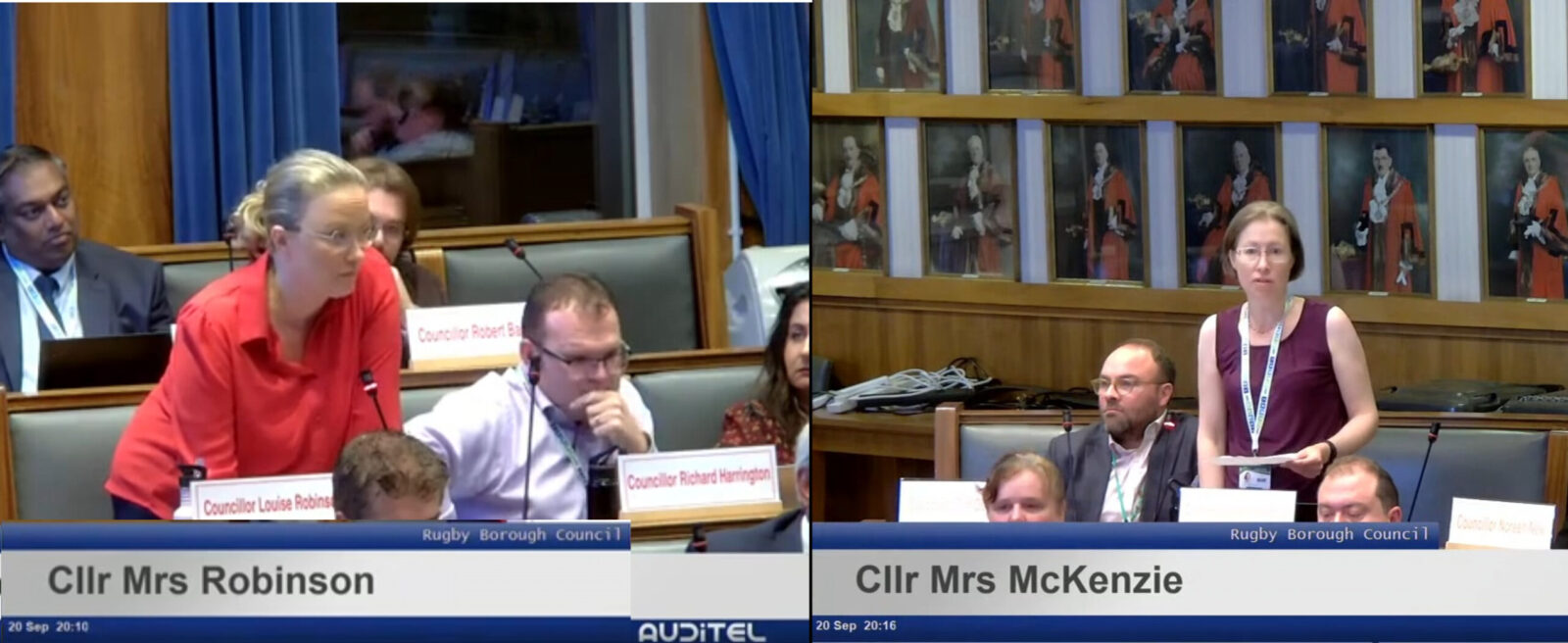Rugby Labour Party Renew Rugby Together
Rugby Borough Council took a leap towards greater equality in last week’s Full Council meeting through a successful cross-party motion to instruct the Council’s Equality and Diversity Working Group to review the use of gendered terms for female councillors.

Proposing the motion in a confident and compelling maiden speech, Cllr McKenzie of the Liberal Democrats said, “from my first day, I have been uncomfortable about the way women councillors are addressed in the chamber”. Cllr McKenzie was referring to the compulsory use of one of the female suffixes, either Mrs, Ms or Miss. Cllr McKenzie went on to “call out” the mandatory requirement as “structural sexism” because “every time you address a woman as Cllr Mrs, you are inadvertently saying they are the exception because councillors are male.”
In a direct plea to her peers, Cllr McKenzie, reminded the Chamber of their responsibilities as councillors, saying it is beholden on us to “uphold the highest of standards of equality and to root out any forms of sexism and racism that we encounter; whether explicit or implicit.” Cllr McKenzie assured the Chamber she had not personally encountered sexism from her peers since her election in May and hoped sincerely that was the experience of other women councillors.
Seconding the motion, and speaking at the close of the debate, Labour’s Cllr Robinson spoke about gender diversity and how the current binary approach to gender in the Council Chamber was “out of step” and non-inclusive adding “we need a level playing field”. In response to calls during the debate from some Conservative councillors for the choice of whether to be referred to as Mrs or Ms, Cllr Robinson suggested that choice was acceptable outside the Chamber, but on official Council business, there is a bigger principle at play which is enshrined in legislation of the Equality Act of 2010.
Cllr Robinson went on to speak about the ripple effect of the language in the Chamber permeating through the documents and culture of the Council, referring to a recent Council document that described committee Chairs as “Chairmen”. Cllr Robinson asked the EDI working group to consider how to embed non-gendered language across the board.
The Labour party asked that the vote be recorded, which meant Councillor titles and names were called out – including the suffix for women Councillors. This exercise went some way to demonstrating the need for simplicity and consistency. Speaking afterwards, Cllr Sayani, who was referred to as Mrs, instead of Ms, said “that proved the point. I would much rather be referred to as Councillor, removing any risk of getting it wrong and causing offence”.
The vote was won with 34 of the 38 votes available; there were three Conservative abstentions and Cllr Mrs Parker (Conservative) voted against the EDI working group reviewing this issue.
If we compare Rugby Borough Council to other Councils, it is in a dwindling minority. Locally, Warwick County Council does not use the suffix and refers to Councillors as Councillors. Even Councils that could be considered bastions of Conservatism such as Kensington & Chelsea Council or Westminster Council do not use a suffix.
Speaking on the absurdity after the debate, Cllr McKenzie said “our use of language matters, singling out women each time they are addressed is antiquated and outmoded. It is time for a root and branch review of equality and diversity in the chamber”. Cllrs McKenzie and Robinson both said that everyone they have spoken with on the issue has expressed shock at the status quo and has been incredibly supportive of the need for change.
This press release has been jointly issued by Labour and the Liberal Democrats in Rugby.
